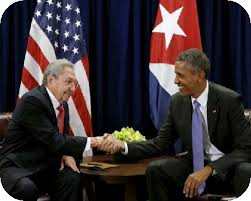 Cuban President Raul Castro and US President Barack Obama
Cuban President Raul Castro and US President Barack Obama
My commentary this week is an expanded version of a response I gave to a Jamaican journalist who asked me: what are the implications for Jamaica and the wider Caribbean of US President Barack Obama’s visit to Cuba and the opening-up of the Cuban market?
President Obama did the right thing by beginning the end of a failed US policy of trying to isolate Cuba. The failed policy is not yet ended. It should be recalled that the trade embargo against Cuba is still on the statute books of the US and it can only be changed by Congress.
While in Cuba on 21 and 22 March, Obama himself admitted that “the bulk of changes that have to be made with respect to the embargo are now going to rely on Congress”.
By executive action, Obama has gone almost to the limits of what he can do. As he explained: “The list of things that we can do administratively is growing shorter”. However, what he has done is significant. Travel restrictions between the US and Cuba has eased considerably, with a surge in the number of Americans visiting Cuba. Just two weeks ago approval was given for individual Americans to go to Cuba for educational travel, and US airlines will begin direct commercial flights this year. Already, airlines have applied for routes into several Cuban areas. American Airlines alone wants 10 flights a day from Miami to Havana. There are another 100 routes for which airlines such as America, Jet Blue, Delta, Eastern and United are scrambling.
Hurdles have also been removed to resume cruises and ferry service from American ports to Cuba. Co-operation on agriculture has started and commercial deals have been announced by major U.S. companies.
At the level of education, grants and scholarships will be available to Cuban students to study in the US. Steady progress is also being made with partnerships in health, science, and the environment. Medical professionals of the two nations will collaborate in areas such as preventing the spread of viruses like Zika and leading new research into cancer vaccines.
But, in the final analysis, while the political hostility between the US and Cuban governments has eased considerably, the wider economic relationship remains in limbo until the embargo is lifted by the US Congress.
There are also some other imponderables that arise from who will replace Obama in the White House next January. For instance, if a Republican nominee wins the US Presidential election in November, the rate of progress in overturning the trade embargo will be slowed. Should Donald Trump win the election, he will want a "deal" that the Cuban government will not stomach. Should it be Ted Cruz, the entire relationship will deteriorate; his expressed antagonism to the Cuban government will set back relations and might even reverse it.
Against this background, the Democratic Presidential hopeful, Hillary Clinton, is a better option for advancing the process of normalisation that Obama has started, including working for the rescinding of the trade embargo. If she wins the Presidency and engages the Congress, she will have support from big Republican businessmen anxious to get into Cuba to take advantage of the commercial opportunities that, over the 50 and more years of the embargo, they have lost to Canadian and European rivals. Even the younger generation of Cuban-Americans want the embargo to end so that they can benefit from the potential economic opportunities.
In a nutshell, therefore, the course of full normalisation of US-Cuba relations, upon which Obama has embarked, cannot be reversed, except in the now unlikely circumstance of Ted Cruz winning the election. But, its completion will still take some time.
What all this means for Jamaica and the wider Caribbean is strong competition for US investment in a range of sectors, including oil, clean energy, tourism, manufacturing, agriculture, and service industries. It is not without significance that representatives of many top business firms were part of Obama’s delegation to Cuba. It is also very noteworthy that the US government has invited the Cuban government to participate in a US-Caribbean Energy Consultation with Vice President Joe Biden in Washington in early May.
After all, Cuba is a market of 11 million people. As its economy grows and the purchasing capacity of its population increases, its attractiveness as a place for investment will rise correspondingly. Located just 90 miles from the US, it is also what Obama called “a natural trading partner”. When the high level of education and training of the labour force, and its proven capacity to adapt to challenges, are added to this mix, Cuba will be an irresistible magnet for US investors.
Even with the embargo still in place, Cuba is already a strong competitor for Jamaica and the rest of the Caribbean. Once the embargo goes, it is only tough dealing from the Cuban government that will limit a flood of new US investment. In large measure, the rest of the Caribbean will suffer from the diversion of US resources – both private and public – into Cuba.
The medium and long term relationship of Cuba and the US will be economic; politics will eventually fall to one side. Just as the US deals with Saudi Arabia, China, Russia and other countries despite their human rights record, such considerations will not be dominant considerations in a future Cuban relationship unless human rights violations escalate obviously and persistently.
The game has changed. The rest of the Caribbean should have seen this coming and prepared themselves to cope with it. There were certainly enough warnings.
Caribbean countries will have to improve their own competitiveness and create better and smarter conditions for business. They should waste no time in doing so.